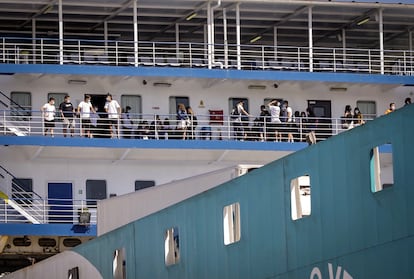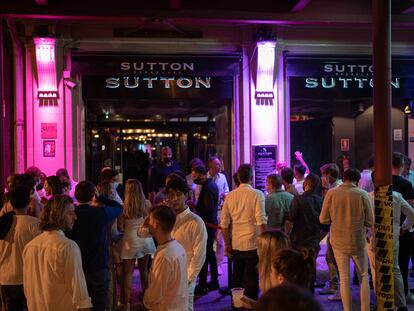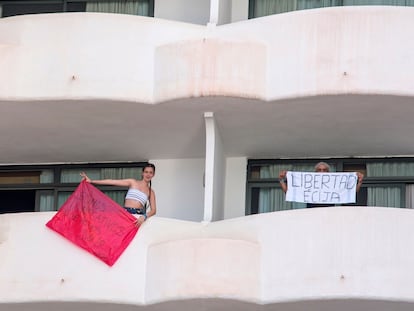Students confined in Mallorca after mass coronavirus outbreak arrive in Valencia
A total of 118 youngsters who were confined to the Balearic Island have been taken by ferry to the mainland. At least 14 of them tested positive upon arrival

A total of 118 of the students who were confined on the Balearic Island of Mallorca due to a mass outbreak of the coronavirus arrived on Thursday by ferry at the port of Valencia. The youngsters, who had previously tested negative for the virus, took the seven-hour journey in an isolated bubble designed and paid for by the Balearic government in order to keep them separate from the rest of the passengers. According to regional official Manuel Palomino, on arrival 77 of the students were due to travel to Andalusia, 20 to Galicia and 21 to Madrid.
The authorities in Valencia had set up a medical tent ahead of the docking of the vessel, with three ambulances and a team of public health specialists also on hand. The students did not even have to disembark at the port – amid strict security measures, a fleet of buses drove onto the ferry once all the other passengers and vehicles had come off, and collected the youngsters from inside, thus avoiding any contact with other people.
In total, 696 students from Madrid on the end-of-term trip have contracted the coronavirus, as well as 135 secondary contacts
The students were given antigen tests before their onward journeys began, and the regional governments involved in the operation had also prepared special vehicles should any of these tests come back positive. During an interview with the IB3 television channel, the Balearic regional premier, Francina Armengol, confirmed that 14 of the 118 students had indeed tested positive for the coronavirus on arrival in Valencia. Eight of them are from Andalusia and five from Galicia.
Meanwhile, 34 other students who had already tested positive for the coronavirus are still in isolation in the Balearics until they are given the all-clear by medical teams, Margot Molina reports.
The students headed back to Madrid will have to continue with the quarantine they began in Palma de Mallorca in their homes, under the supervision of the regional health authorities. In total, 696 students from Madrid on the end-of-term trip have contracted the coronavirus, as well as 135 secondary contacts (i.e. relatives in the Madrid region). One of the latter, the father of a student, is currently still in hospital with Covid-19. There are 2,886 more contacts in Madrid who are also in quarantine.
The youngsters left the Palma Bellver Hotel just after 7am, ending their confinement on the Balearic Island and starting the journey home. “We are keen to get back because it’s all been a little strange,” explained Alejandra, one of the students who had been confined in the hotel. She stated that she would continue the quarantine once she was home. “In the hotel we were at risk, surrounded by positive cases who were jumping from balcony to balcony,” another student explained. “They’re very irresponsible and were not just risking themselves but us too.”
All of the students were given the option of taking a test before they boarded the ferry, and 30 of them agreed. Of these, two tested positive and as such had to remain on the island.
A judge from a Palma court on Wednesday suspended the confinement of the students who had received a negative result from a PCR test. They had been locked down in the Palma Bellver Hotel since Sunday due to having been close contacts with the positive cases detected after the student parties held on the trip. That same day, around 50 youngsters left the hotel and traveled back home to various locations on the Iberian peninsula via their own means.
There are now 80 students on the island of Mallorca who have tested positive, of whom 16 are being treated in an area hospital. The rest are confined to the hotel.
According to data supplied on Wednesday by the Health Ministry, there are nearly 2,000 positive cases associated with this mass coronavirus outbreak, and 6,000 people in quarantine. The incident has affected 12 of Spain’s 17 autonomous regions.
End of year trips
Every year, around 12,000 students from across Spain travel to Mallorca to celebrate the end of the school year. Some have just completed their university admission exams (EVAU), while others have finished their last year of secondary school (ESO). In the case of the former, the students are between 17 and 18 years old and they organize their own trips, and in the latter, they are between 15 and 16 and travel under the supervision of adult monitors.
The mass coronavirus outbreak involves activities that took place between June 12 and 18, just as restrictions on nighttime bars and music venues were being lifted on the island. But nightclubs in the region remain closed, meaning many youngsters gathered to drink outdoors, a practice commonly known in Spain as a botellón.
On social media, dozens of videos showed students drinking on the streets, dancing together, sharing drinks and singing at the top of their voices – all without social distancing or face masks. Up until June 26, it has been mandatory in Spain to wear a face mask in both indoor and outdoor spaces, regardless of whether social distancing can be maintained. These rules were recently relaxed, meaning the covering does not need to be worn outside – but only on the condition that a safe distance of 1.5 meters can be respected.
The main incident under review is the Reggaeton Beach Festival, which took place in Palma on June 15. The event was canceled by police mid-show for failing to comply with coronavirus safety measures. Other infections have also been tracked to parties on cruises and in coves, where attendees did not follow safety measures.
English version by Simon Hunter.










































